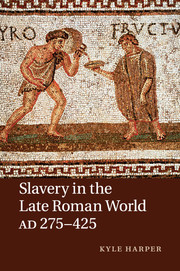Book contents
- Frontmatter
- Contents
- List of tables
- Acknowledgments
- PART I THE ECONOMY OF SLAVERY
- PART II THE MAKING OF HONORABLE SOCIETY
- PART III THE IMPERIAL ORDER
- Introduction
- 9 Citizenship and civil conflict: slave status after the Antonine Constitution
- 10 The enslavement of Mediterranean bodies: child exposure and child sale
- 11 The community of honor: the state and sexuality
- 12 Rites of manumission, rights of the freed
- CONCLUSION
- APPENDIXES
- Bibliography
- Index
10 - The enslavement of Mediterranean bodies: child exposure and child sale
Published online by Cambridge University Press: 05 August 2011
- Frontmatter
- Contents
- List of tables
- Acknowledgments
- PART I THE ECONOMY OF SLAVERY
- PART II THE MAKING OF HONORABLE SOCIETY
- PART III THE IMPERIAL ORDER
- Introduction
- 9 Citizenship and civil conflict: slave status after the Antonine Constitution
- 10 The enslavement of Mediterranean bodies: child exposure and child sale
- 11 The community of honor: the state and sexuality
- 12 Rites of manumission, rights of the freed
- CONCLUSION
- APPENDIXES
- Bibliography
- Index
Summary
STARS, STRANGERS, AND SLAVES
The Roman empire of the fourth century was home to a litigious society. A one-time lawyer in the age of Constantine, Firmicus Maternus, described the legal system, unflatteringly, as a world of greed, mischief, revenge, and graft. So Firmicus retired from the legal profession to a more satisfying occupation: astrology. He authored “l'ouvrage d'astrologie le plus complet de ceux que nous a laissés l'Antiquité.” His work is a bewildering farrago, the product of ancient man's millennial intimacy with the sky. Astrology in late antiquity was an exact science. The disposition of the stars was imprinted on the soul of the infant at birth, and a professional like Firmicus could read destiny in a birthday. Firmicus offered the horoscopes of emperors, slaves, and everything in between. The stars might decree that a slave would never be freed, or that a slave would be freed at a young age. Slavery is omnipresent in the social–astronomical imagination of Firmicus, yet, nowhere is there to be found a barbarian slave hauled across some faraway border. For Firmicus – writing in Sicily – if the stars had a malevolent aspect, anyone could become a slave.
It is noteworthy that the single most detailed chart in his work foretold the fate of exposed infants. The unmistakable impression is that exposure awaited not a few of the human bodies who passed into the world. The exposed infant had, in reality, the most indeterminate future of all.
- Type
- Chapter
- Information
- Slavery in the Late Roman World, AD 275–425 , pp. 391 - 423Publisher: Cambridge University PressPrint publication year: 2011



